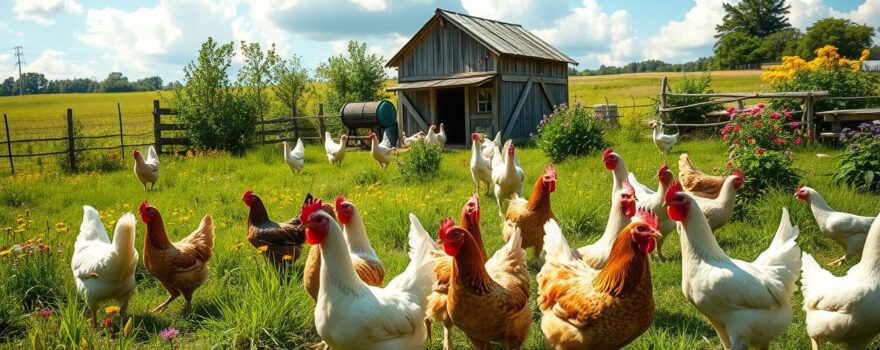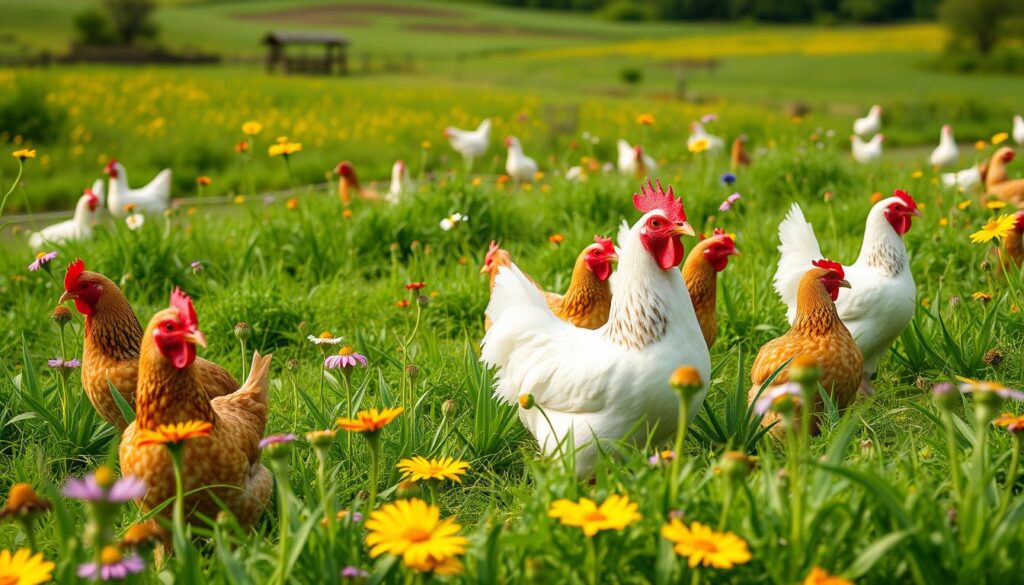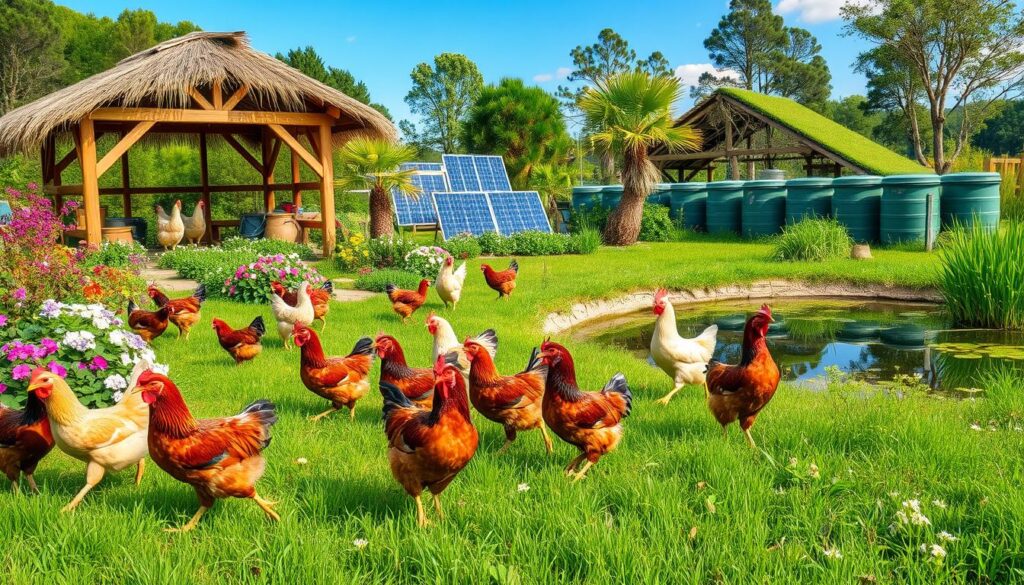
Organic poultry farming focuses on the health and natural behavior of chickens. It avoids synthetic growth hormones, antibiotics, and genetically engineered animals. All feed must be 100% organic, including supplements like kelp.
Chickens for meat or eggs must stay organic from day two. This ensures they keep their organic status for life.
In the United States, producers need to sell over $5,000 of organic products yearly. They must get certified by a USDA-approved agent. Producers must also provide a healthy environment for the chickens.
This includes access to the outdoors, shade, shelter, and places for exercise. They must keep records of feed, medications, and transactions for at least five years. This proves they follow the rules.
Key Takeaways
- Organic poultry production promotes animal welfare and environmental sustainability through the use of natural treatments and the prohibition of synthetic inputs.
- All agricultural components of organic broiler feed, including supplements, must be 100% organic.
- Organic poultry must have continuous access to the outdoors and be provided with suitable living conditions that accommodate their natural behaviors.
- Organic poultry producers must maintain detailed records of all feeds, medications, and transactions to demonstrate compliance with regulations.
- Organic poultry production is a highly regulated system that requires certification by USDA-accredited agents for producers selling over $5,000 worth of organic products annually.
How to Implement Organic Farming Practices in Broiler Chicken Production
To start organic farming for broiler chickens, you must follow the USDA’s National Organic Program (NOP) rules. You need to keep detailed records of feed, medicines, and sales. This ensures organic birds and products stay free from banned substances.
Organic chicken farmers must have strong health plans for their birds. They can’t delay medical care for sick animals to keep their organic status. Any farm selling over $5,000 in organic products each year must get certified by a USDA-approved agent.
| Requirement | Details |
|---|---|
| Land Qualification | Land must not have had any prohibited substances applied for three years prior to the harvest of organic crops. |
| Organic Management | Poultry intended for slaughter or egg production must be under continuous organic management starting from the second day of life. |
| Organic Feed | All certified animals must receive 100% certified organic feed, with all pastures also needing to be certified organic. |
| Animal Health | Producers should select livestock species resistant to prevalent diseases and parasites, provide sufficient feed, appropriate housing, and administer preventative vaccines. |
| Housing and Outdoor Access | Housing for livestock must allow for access to the outdoors, shade, shelter, exercise areas, fresh air, and sunlight year-round. |
| Soil Management | Producers must use tillage and cultivation practices that maintain or improve soil conditions and minimize erosion. |
By sticking to these strict rules, organic broiler chicken farmers can care for their animals better. They also help the environment and meet the demand for free-range broiler chickens and organic poultry products.
“Sustainable chicken farming reduces waste, conserves water, and improves soil health, contributing positively to the environment.”
Importance of Organic Feed for Broilers
Organic broiler production starts with the feed. The National Organic Program (NOP) Final Rule says all feed must be 100% organic. This includes all parts of the feed, like fields and pastures. It ensures a complete approach to 100% Organic Broiler Feed and Organic Poultry Nutrition.
Challenges in Sourcing Organic Feed Ingredients
The demand for organic poultry is rising. But finding Sustainable Feed Sourcing for organic broilers is hard. Small producers face high costs and limited availability of organic feed ingredients.
Alternatives to Conventional Protein Sources
Organic poultry farmers are looking for new solutions. They are using insects, seaweed, starfish, mussels, and forage crop extracts. These alternatives meet the nutritional needs of organic broilers and support sustainable farming.
| Alternative Protein Source | Nutritional Benefits | Sustainability Advantages |
|---|---|---|
| Insects | High in protein, healthy fats, and micronutrients | Efficient feed conversion, low environmental impact |
| Seaweed | Rich in vitamins, minerals, and antioxidants | Sustainable marine-based resource, can be grown without land |
| Starfish and Mussels | Excellent source of protein and essential amino acids | Utilization of byproducts, support for aquaculture systems |
| Forage Crop Extracts | Provide a diverse range of nutrients and phytochemicals | Can be grown organically, contribute to soil health |
By using these Alternative Protein Sources for Organic Poultry, farmers can solve the problem of Sustainable Feed Sourcing. They ensure their flocks get the Organic Poultry Nutrition they need to grow well.
Housing and Management for Organic Broiler Flocks
In organic broiler production, it’s key to provide good housing and management. This ensures the birds’ well-being and natural behavior. Organic poultry producers must follow strict USDA National Organic Program (NOP) rules. These rules help create a suitable environment for organic broilers.
Providing Outdoor Access and Enrichment
Organic broiler housing must offer outdoor access all year. This lets birds do natural things like scratching and dust-bathing. The houses need shade, shelter, exercise areas, fresh air, clean water, and sunlight.
Organic producers also need to add enrichment features. This includes clean, organic bedding and shelters for exercise and comfort. It’s important to keep the air clean and the temperature right inside.
Yards, feeding pads, and laneways must be well-drained. This prevents waste and contaminated water from harming the flock. It keeps the environment clean and sustainable for the birds.
| Organic Broiler Housing Requirements | Outdoor Access for Organic Poultry | Enrichment for Organic Broiler Flocks |
|---|---|---|
| Appropriate housing design to allow natural behaviors | Year-round access to the outdoors for all birds | Provision of clean, dry bedding (organic if using roughages) |
| Proper temperature, ventilation, and air circulation | Access to shade, shelter, exercise areas, fresh air, and sunlight | Shelters designed to allow for natural maintenance and comfort |
| Well-drained yards, feeding pads, and laneways | Opportunity for birds to scratch, dust-bathe, and forage | Compliance with USDA NOP regulations for organic production |
By focusing on Organic Broiler Housing Requirements, Outdoor Access for Organic Poultry, and Enrichment for Organic Broiler Flocks, producers can help their broilers thrive. This ensures they can express their Natural Behavior in Organic Broiler Production in a healthy, sustainable environment.
Breeding and Genetics for Organic Broiler Production
Organic broiler production needs a special approach to breeding and genetics. This ensures the health and resilience of the flock. Producers look for traits like heat stress tolerance and disease resistance. They use genetic tools to understand how chickens handle heat, crucial for those raised outdoors.
The old way of selecting broilers started in the 19th century. It used Asian breeds and four main lines: Leghorn, Rhode Island Red, New Hampshire, and Plymouth Rock. Today, breeders mix specific males and females to create the F4 commercial hybrid.
| Selective Parameters for Organic Broiler Breeders | Production Criteria |
|---|---|
|
|
Organic broiler producers also focus on traits that support natural behaviors. This ensures their flocks adapt well to organic environments. By choosing these traits, they build strong flocks that do well in organic systems.

“The genetic makeup of animals can significantly influence their suitability for organic farming practices.”
The organic poultry industry is always changing. Breeders must plan ahead, several years in advance. They need to keep up with genetic progress to meet organic broiler needs.
Disease Prevention and Management in Organic Systems
Keeping organic broiler flocks healthy is crucial for producers. Since antibiotics are banned in organic farming, organic Poultry Disease Prevention uses natural methods. These Natural Treatments for Organic Broilers help control Salmonella and E. coli without antibiotics.
Organic farming focuses on strong biosecurity. This means keeping everything clean, disinfecting tools, and controlling who enters the farm. Organic producers also ensure their birds get the best nutrition and keep stress low to keep them healthy.
Herbal Remedies and Probiotics
Without antibiotics, organic farmers use herbs and probiotics to fight diseases. These natural options can tackle infections and help with nutrition. It’s important to work with a vet who knows organic farming to get the right treatment.
- Herbs like garlic, echinacea, and turmeric help fight off infections and boost the immune system.
- Probiotics keep the gut healthy, helping with digestion and the bird’s defense.
Using these Antibiotic-Free Disease Management methods, organic farmers can keep their flocks healthy. This meets the demand for Organic Poultry Disease Prevention while keeping birds well.
“Organic regulations emphasize the importance of access to pasture for organic livestock to actively forage and maintain better health.”
Environmental Impact of Organic Broiler Farming
Organic broiler farming is better for the environment than traditional farming. It avoids synthetic fertilizers and pesticides. This leads to less greenhouse gas emissions, healthier soil, and less water use. Using composted poultry litter as fertilizer is another way to improve the environment.
By using a Circular Economy in Organic Broiler Farming, waste is turned back into useful products. This method cuts down on waste and saves resources. It helps make the poultry industry more sustainable.
| Environmental Impact Metric | Reduction Achieved from 1965 to 2010 |
|---|---|
| Greenhouse Gas Emissions | 36% decrease |
| Farmland Usage | 72% decrease |
| Water Usage | 58% decrease |
The poultry industry has made big steps in reducing its environmental impact. Organic and sustainable farming practices help even more. They contribute to a greener food system.
“Producing the same amount of chicken today as in 1965 has led to a 50% less impact on the environment.”

Marketing and Consumer Perceptions of Organic Poultry
The demand for Organic Broiler Chicken is growing. People want healthier and more sustainable food. Surveys show that consumers expect organic chicken to be raised free-range and without antibiotics.
Producers can market Organic Poultry by focusing on its benefits. These include better animal welfare, more nutrients, and helping the environment.
Marketing Strategies for Organic Poultry should build a strong brand. This attracts customers who are willing to pay more. Good branding and communication help differentiate Organic Chicken Products and meet Consumer Expectations for Organic Poultry.
| Organic Poultry Attributes | Consumer Expectations | Willingness to Pay Premium |
|---|---|---|
| Free-range rearing, natural feeding, antibiotic-free | 91.7% agree chickens can feel pain (UK), 91.1% support mandatory animal welfare laws (China) | 59% of EU citizens, 57% of Americans, 72% of urban Kenyans |
| Improved animal welfare, enhanced nutrition, environmental benefits | 66% of British, 86% of Americans consider animal welfare in purchases | 5-20% premium (UK), 20-30% premium (France, Netherlands) |
By focusing on Consumer Expectations for Organic Poultry and using smart Marketing Strategies for Organic Poultry, producers can meet the Organic Broiler Chicken Consumer Demand. They can also make their Organic Chicken Products stand out in the market.
“Organic poultry must be raised without synthetic pesticides, antibiotics, hormones, and mammalian byproducts in the feed.”
Regulations and Certification for Organic Broiler Production
Organic broiler production in the United States follows rules set by the USDA’s National Organic Program (NOP). Any organic poultry operation selling over $5,000 of organic products yearly must get certified. This ensures they follow strict rules for feed, housing, healthcare, and tracking products.
Recordkeeping and Traceability Requirements
Organic broiler producers must keep detailed records of their operations. This includes record-keeping in organic broiler farms for feed, medications, and all transactions involving organically managed animals and products. These strong traceability of organic broiler products rules help verify organic claims and support USDA audits and enforcement.
The USDA Organic Certification for Broiler Chickens has specific deadlines for compliance. The Organic Livestock and Poultry Standards (OLPS) rule was published on November 2, 2023. Most requirements must be met by January 2, 2025. Certified organic broiler operations have until January 2, 2029, to meet updated stocking density and soil rules.
Organic producers are advised to take part in training and self-assess their operations. This helps them prepare for the OLPS rule. Webinars and resource documents are available to aid in the transition to new organic poultry production rules.
“The key to maintaining consumer trust in organic poultry products is through robust recordkeeping and traceability requirements. This ensures the integrity of the organic label and allows for effective auditing and enforcement of organic standards.”
The path to Organic Broiler Chicken Production Benefits is full of promise. It leads to sustainable and ethical poultry farming. By following the Importance of Organic Farming Practices in Poultry, farmers can better care for their birds. They also help the environment and give consumers healthier food.
Organic farming means giving birds space to roam and using the right breeds. It also means using new ways to manage farms. This way, farmers can make less harm to the environment. They also provide food that is full of nutrients.
The organic poultry world is growing, and it’s a good thing. It needs organic farming, smart breeding, and ways to keep diseases away. This growth lets farmers offer more choices to people who want healthy, green food.
By choosing Organic Broiler Chicken Production, farmers help the poultry industry grow in a green way. They give people food that fits their values and tastes. The work of farmers, the help of policymakers, and the support of consumers are key. Together, they will make the Sustainable Future of Organic Poultry a reality.